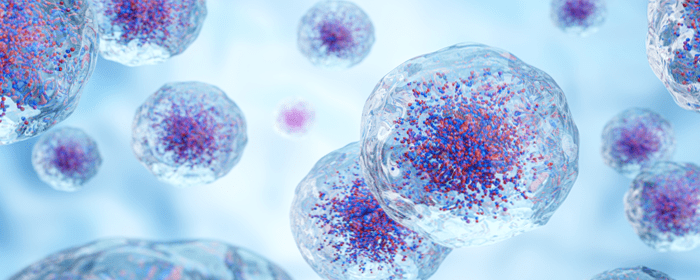
by admin | Mar 22, 2023 | Stem Cell Research, Mesenchymal Stem Cells, Stem Cell Therapy
Currently, it’s estimated that over 1.3 million people in the U.S., and 10 million people around the world, are living with inflammatory bowel disease (IBD). IBD is a chronic and recurrent disease characterized by inflammation of the tissues of the digestive tract[1]. Two specific diseases included under the term IBD include Crohn’s disease (CD) and ulcerative colitis (UC).
While the exact cause of IBD has yet to be determined, research seems to suggest abnormal activation of the immune system, genetic susceptibility, and altered intestinal flora resulting from mucus barrier defects play some type of role in the pathogenesis of this disease. Currently, a complete IBD treatment or cure exists. Recent research has also demonstrated that adults with IBD are more likely to suffer from other chronic conditions, including diabetes, arthritis, lung cancer, and heart disease[2].
Clinical trials using stem cell therapy have demonstrated promising results for the potential treatment of IBD, including long-term remission in some patients.
In this review, Zhang et al. review the upcoming stem cell transplantation methods for clinical application and the results of ongoing clinical trials exploring the use of stem cell transplantation as a potential treatment for IBD.
Specific stem cells, known as hematopoietic stem cells (HSC), have been shown to be particularly effective when used as a therapeutic treatment. HSCs are isolated from blood, bone marrow, and cord blood that migrate directly to damaged mucosal tissues. Initially used in patients with IBD because of other hematologic indications, including leukemia and non-Hodgkin’s lymphoma, the use of HSC therapy (HSCT) demonstrated improvement in intestinal lesions. Further study using HSCT showed that some patients with UC and CD demonstrated sustained clinical and endoscopic improvement. The authors point out that while these limited clinical trials have demonstrated promising results, the observed risk of relapse currently prevents HSCT from being classified as an effective treatment and calls for larger samples and longer-term efficacy observations.
Another stem cell treatment currently being evaluated for the treatment of IBD is the use of mesenchymal stem cells (MSCs). When injected intravenously, MSCs demonstrate the ability to reach the injured area of the intestine, colonize mucosa to control inflammation, improve microcirculation, and repair damaged tissues. A systematic review conducted by Lalu et al. found that the use of MSCs did not show significant side effects and was a relatively safe therapeutic treatment option.
Zhang et al. conclude that the significant advance in stem cell research made over the past twenty years has made them a promising therapeutic option for the treatment of IBD. Although a limited number of clinical trials have confirmed the efficacy of specific stem cells, specifically HSC and MSCs in IBD, the authors point out that the current treatments need to be improved and further research must be conducted in order to fully understand the complexity associated with the condition.
While this review focuses primarily on the use of HSC and MSC, Zhang et al. call for continued preclinical exploration of other cell therapy methods with the goal of improving the quality of life of IBD patients.
Source: “Stem Cell-Based Therapies for Inflammatory Bowel Disease – PMC.” 31 Jul. 2022, https://www.ncbi.nlm.nih.gov/pmc/articles/PMC9368934/.
[1] “Inflammatory bowel disease (IBD) – Symptoms and causes.” https://www.mayoclinic.org/diseases-conditions/inflammatory-bowel-disease/symptoms-causes/syc-20353315.
[2] “People with IBD Have More Chronic Diseases – CDC.” https://www.cdc.gov/ibd/features/IBD-more-chronic-diseases.html.

by admin | Dec 5, 2019 | Crohn's Disease, Stem Cell Research, Stem Cell Therapy
Over the past few years, data has accumulated showing the promise for cell-based therapies to help in treating Inflammatory bowel disease with stem cells. Specifically, stem cells appear to offer the opportunity to overcome several weaknesses associated with conventional therapies that have targeted perianal Crohn’s disease.
Based on these positive results, scientists and healthcare providers have become more adamant about understanding the broader role stem cells could play in the treatment of all inflammatory bowel disease. A new review published in Current Gastroenterology Reports discusses this specific issue and offers insights into the direction of stem cell research as it relates to inflammatory bowel disease.
The authors of this review discuss data from over a dozen clinical trials that have already been conducted on the impact of stem cell therapies in Crohn’s disease. Thus far, much of the success of regenerative medicine for the treatment of Crohn’s disease has been for the specific treatment of perianal Crohn’s disease, which occurs when the digestive and gastrointestinal inflammation associated with Crohn’s disease extends to the anal area.
Given the frequency with which the lining of the intestine is inflamed in inflammatory bowel disease, including both perianal Crohn’s disease and non-perianal Crohn’s disease, research efforts are focusing more and more on how stem cells may be able to combat this type of luminal disease. The authors put forth suggestions for the types of information that researchers should aim to obtain if we are to adequately treat intraluminal disease with regenerative medicine.
The potential of stem cells to address inflammatory bowel disease that has been demonstrated so far provides hope that this type of strategy will help not only patients with perianal Crohn’s disease but those with other forms of inflammatory bowel disease as well. More research should help to determine if and how these therapies can be deployed to help this patient population.
Reference: Lightner, A.L. (2019). Stem cell therapies for inflammatory bowel disease. Current Gastroenterology Reports, 21(4), 16.

by admin | Nov 27, 2019 | Crohn's Disease, Mesenchymal Stem Cells, Stem Cell Research, Stem Cell Therapy
Crohn’s disease, a form of chronic inflammatory bowel disease, affects an estimated 700,000 people in the United States, affecting men and women equally. While the disease is characterized by abnormal inflammation in the gastrointestinal and digestive tracts, some people with the illness develop perianal Crohn’s disease. In this case, the inflammation extends to areas around the anus. The precise proportion of Crohn’s disease patients who develop perianal Crohn’s disease is debated, but the need for better treatments for the condition is not. A new and unique treatment is the use of stem cells to treat Perianal Crohn’s Disease.
Unfortunately, though there are several drug and surgical interventions that have been developed to treat perianal Crohn’s disease, each of the available treatment options suffers critical limitations, including risks for adverse side effects. There is no available therapeutic approach that successfully achieves long-term remission.
Based on the need for – and lack of – more efficacious interventions for perianal Crohn’s disease and the ability of cell-based therapies to address similar types of disease, researchers have positioned that stem cell therapy may be a promising avenue for the relevant patient population. A recent review published in the Journal of Crohn’s and Colitis covers the research that has been conducted to address this possibility and the data that suggest that mesenchymal stem cells could provide a safe and effective way to treat perianal Crohn’s disease without the unwanted side effects associated with conventional treatment options.
In this review, the authors cover clinical trials on cell-based therapies for perianal Crohn’s disease, including phase 1, phase 2, and phase 3 randomized controlled trials. The authors consider the differences in outcomes between conventional treatments and cell-based therapies and offer suggestions for the direction of research into the use of stem cells for the treatment of perianal Crohn’s disease.
Reference: Lightner, A.L. & Faubion, W.A. (2017). Mesenchymal stem cell injections for the treatment of perianal Crohn’s disease: What we have accomplished and what we still need to. Journal of Crohn’s and Colitis, 11(10), 1267-1276.

by admin | Aug 16, 2019 | Health Awareness
Crohn’s disease is a rare but serious inflammatory bowel disease. The condition causes the digestive tract lining to become inflamed, leading to symptoms such as diarrhea, abdominal pain, fatigue, weight loss, and malnutrition. Individuals with Crohn’s disease are also more likely to experience small intestine permeability, or what’s known as “leaky gut.” While there is no cure for the disease, medications and lifestyle modifications can be used to help manage the condition. In particular, research suggests zinc supplements may help to combat leaky gut associated with Crohn’s disease.
What is Leaky Gut?
In leaky gut syndrome, the gaps in intestinal walls loosen, allowing bacteria and toxins to pass through the intestines and into the bloodstream. Experts believe the condition may be linked to chronic and autoimmune conditions, including celiac disease and type 1 diabetes.
Leaky gut can occur whenever the balance between good and bad gut bacteria is off. The intestinal tract is home to hundreds of good bacteria, which help to manage digestion, process nutrients, and fight off bad bacteria.
Can Zinc Help?
While optimizing diet to maintain digestive health is a good start for many individuals, there are many other factors beyond nutrition at play when it comes to leaky gut. This is especially true for people with Crohn’s disease. Everything from compounds in tap water to medications can alter gut flora, which is why many individuals, and especially those with inflammatory bowel diseases, need an extra line of defense against leaky gut.
Because Crohn’s disease can inhibit proper nutrient absorption, people with the condition may face deficiencies in key vitamins and minerals. In particular, studies suggest that a zinc deficiency contributes to damage in the gut membrane barrier, but with zinc supplements, small intestine permeability can be improved. In a study published in Inflammatory Bowel Diseases, the majority of patients who were given 110 mg of oral zinc sulfate supplements for 8 weeks had normal intestinal permeability and did not relapse. The findings suggest that zinc supplements can resolve permeability issues in individuals with Crohn’s disease and that strengthening the intestinal barrier may minimize the risk of relapse.
While each patient should check with their doctor before introducing any new supplements to their daily regimen, the findings do seem to be promising and may suggest that a single vitamin could play a powerful role in Crohn’s disease management.





 St. Petersburg, Florida
St. Petersburg, Florida
